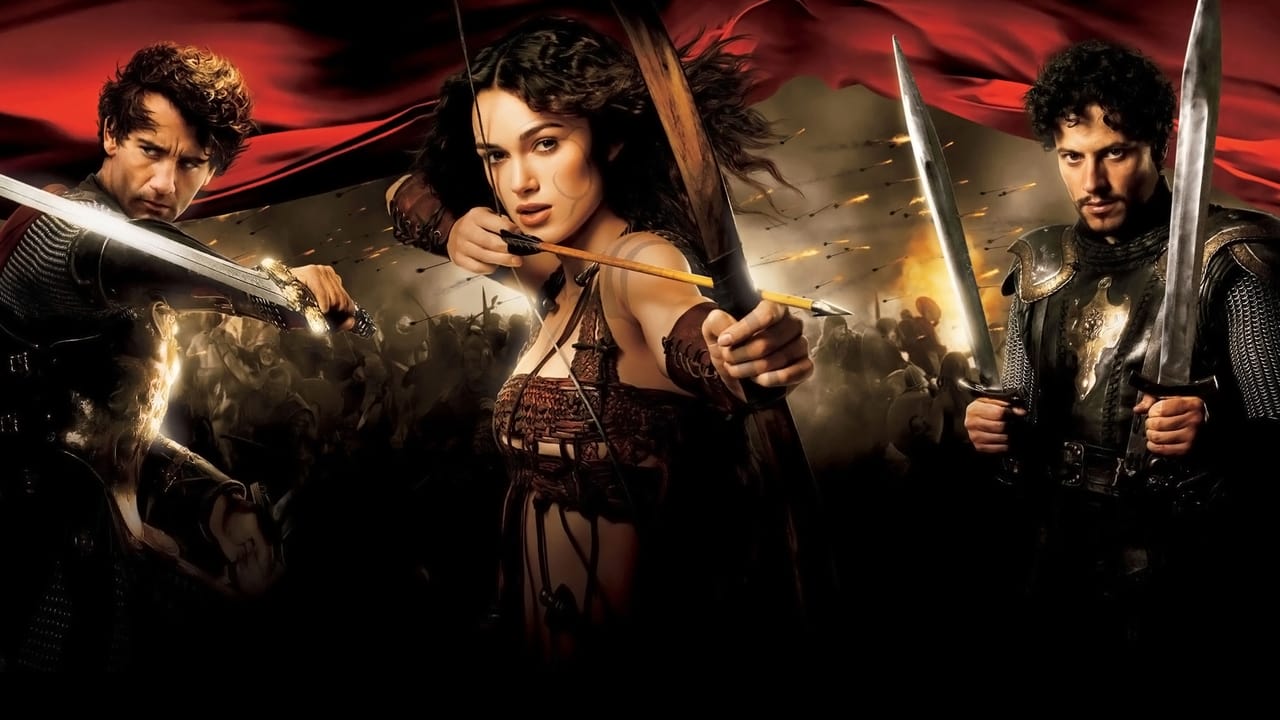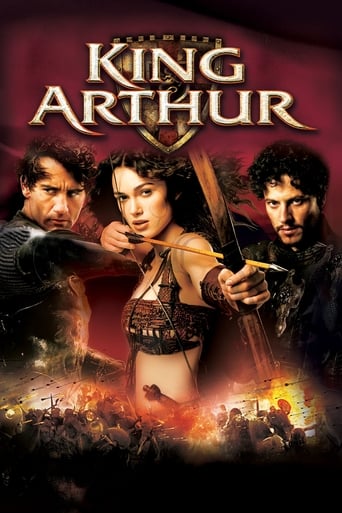

It really made me laugh, but for some moments I was tearing up because I could relate so much.
... View MoreGreat story, amazing characters, superb action, enthralling cinematography. Yes, this is something I am glad I spent money on.
... View MoreStory: It's very simple but honestly that is fine.
... View MoreThis is a dark and sometimes deeply uncomfortable drama
... View MoreThis film is an interesting take on the legend of King Arthur, but it just feels generic after a while. Also, I don't think this history is any more "authentic" than any other version of the story, contrary to what they claim.
... View More(Flash Review)The director amazed me .he managed to squander a massively stellar cast with the pathetic execution of a big budget movie. From the first few scenes, there were blatant lighting continuity problems with different lighting tones, contrast level and intensities. During some big battles with camera angled up, to accentuate battle drama, there was a mix of smoke and heavy clouds and then some shots it was just partially cloudy with blue sky. That lack of quality ran into the script as well with cliché moment after cliché moment which muted any impact the music score had on eliciting emotions from the audience. Onto the plot, King Arthur and his loyal knights are deceived and forced into one last mission to officially receive their freedom papers from the Roman Empire. Will they follow through? If so, how many will survive the final mission? Another abrupt moment was when Keira Knightley's character is rescued from a dungeon and later she unexpectedly goes from being shackled to a highly skilled tribal warrior. Avoid at all costs!
... View MoreThis is one more of those films that, under the popular saying "behind a lie there is always a true origin", seeks to reinvent a classic story, giving it new surroundings and new characters seemingly more realistic and historically accurate. It is a high but calculated risk because if there is a myth about which many alleged historical origins have been pointed out is the King Artur legend. The film is set in the final centuries of the Roman Empire and depicts the abandonment of Great Britain and Hadrian's Wall. Artur is transformed into a hired knight who serves the Romans and that it has the duty to protect a pope's favorite (at that time Christianity was already the official religion of the empire, although Celtic paganism still prevails In the British Isles) from the Saxon incursions. Obviously there are historical errors, more or less obvious, but this is not as glaring as the absence of epic sentiment in a movie that tries to be epic and never succeeds. There are even some scenes that have been ruined by minor details such as incomprehensible battle cries or cries in Latin that are never properly translated or subtitled, and which end up appearing ridiculous.Clive Owen is good at action scenes but lacks the presence and charisma that his character demands. Arthur's knights are never developed individually except for Bors (Ray Winstone) and Dagonet (Ray Stevenson) although they are usually played by talented actors, eventually becoming highly secondary characters. Keira Knightley, an actress used to period films, played Guinevere, a character who does not suffer from the same lack of development but has been poorly thought out, overly masculinized, very stereotyped and sometimes sexualized, in a development line that ruins later attempts to make credible her wedding with Arthur, a character who spends the entire movie without any romantic chemistry with her. The film is slow and boring at times, but I dealt very well with it.In conclusion: it is a film with an interesting story, which entertains the audience, but that is far from good.
... View MoreBest paper is made out of trees. Once it's used and discarded, it gets recycled into a lower grade paper. Repeated recyclings result in a product just good enough to wipe your behind with.It's the same thing with the Hollywood screenplays. The best stories come directly from nature. Eventually they get recycled and regurgitated into a pulp that always tastes the same and has no quality other than being the toilet fodder. Once in a while somebody somewhere in Hollywood reads an article or two about something in newspapers and jumps to use it as a new flavor to spice the old swill up a little. That's how films seem to be made these days.That brings us to "King Arthur". One scientific novelty emerged in the 2000s concerning the legendary first king of England: that he may have been of Roman origin, as some new archaeological findings suggested. To some the news that sparks imagination and sheds light on that largely undocumented period of history, to others a valuable political link between the Roman Empire and the British Empire, it's something that definitely deserves to be put on screen. Unfortunately, there's that guy called Jerry Bruckheimer, that sells swill for a living, who woke up one morning and realized he needs a sword-and-sandal film in his portfolio. He hired the usual goons that approached the subject hastily and, instead of doing a proper research around the new take on Arthur, they just patched up all the gaps (and there were a lot) with the usual clichés, especially of sword-and-sandal genre, slapped on the label "historically accurate" and shipped it off to theaters hoping the label alone will sell it.The tagline lied - this is by no means a historically accurate representation, even if Arthur indeed happened to be a Roman named Lucius Artorius Castus. Coming from David Franzoni, who wrote "Gladiator", that's hardly a surprise, though. Again, huge liberties, if we can call them that, have been taken to serve a simplistic story, based on some strange conception that people the legends were made around were already acting and talking like legends during their actual lifetime.The battle scenes are the most obvious sign of that misguided approach. Artorius and his horsemen are too tiny a bunch to convince they'd have a meaningful impact on a battlefield other than in commanding roles. Their special skills and ability to single-handedly defeat multitudes of enemies is not what you'd see in a real battle, but rather something that would emerge in retellings afterwards, yet that's precisely what we see them do: fighting in a more "legendary" manner than their namesakes in "Excalibur". The dialog follows the same lines, but heart is confused with pathos. Artorius is stilted and artificial as if he came straight off the stage and every word he utters bears weight, meaning and poignancy, and is not necessarily in tune with what happens around him. His Sarmatian horsemen are one-note sketches, less a bonafide historical figures and more a bunch of a comic book super heroes. One has a trained hawk, one can shoot a nut off a mosquito with an arrow, one wields two swords at once, one cracks jokes... they're about as historical as Ninja Turtles. Geography grasp of the script is terrible and is a cause of crucial plot holes. The knights guard the Hadrian Wall, at the time the northernmost frontier of the Roman Empire, yet they have to be informed by their superiors from the south that there is an invasion coming from the north. Wouldn't Artorius' men be the first to know? The nobleman they are ordered to collect lives with his entire entourage deep into the wrong side of the Wall, in an undefended territory, what no aristocrat, especially an important one, would ever do. On top of that it's him that shares the latest news from Rome with Artorius instead the other way round. How come the crucial communication is bypassing the keepers of the frontier all the time? Timeline is off, too, and concerns mostly queen Guinevere. The box-office nowadays calls for a strong female character, so it had to be a "warrior queen", not just an ordinary one. Ancient Britain does remember one queen Boudicca, a strong female military commander the new Guinevere was likely modeled after. It's just that she lived four hundred years too early for this and deserves a film of her own. No place for her here. They squeezed Merlin into the story somehow, too, but who cares. There is a dark tone to the film, which is fitting, and there is the anti-church sentiment that is about the only thing I genuinely liked.What the film is missing is a lot. There is no ambition other than the cash grab. There is no heart. There is no connection between the warriors and the commoners who would supposedly be so enamored with Artorius to pass the legend on. There is no Uther, no Morgana and no Mordred, which is a shame because the main villain could have at least come away with a better name than "Cerdic". There isn't a single rape scene, either, and that's both historically inaccurate and a bit ironic: as film that successfully rapes both the history and the legend could use a good rape scene or two.
... View More